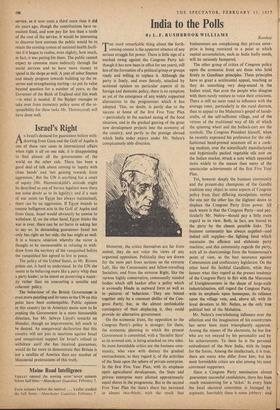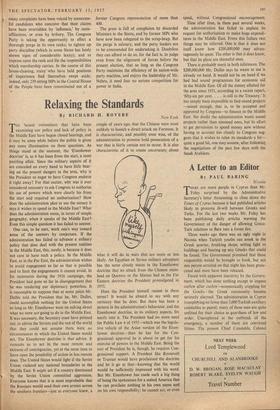India to the Polls
By L. F. RUSHBROOK WILLIAMS THE most remarkable thing, about the forth- coming contest is the apparent absence of any serious struggle for power. There is little sign of a marked swing against the Congress Party (al- though it has now been in office for ten years), still less of the formation of a political group or groups ready and willing to replace it. Although the party is freely, and even fiercely, attacked by sectional opinion on particular aspects of its foreign and domestic policy, there is no symptom as yet of the emergence of any widely supported alternatives to the programmes which it has adopted. This, no doubt, is partly due to the success at home of the first Five Year Plan —particularly in the,marked easing of the food situation, and in the gradual gearing of the great new development projects into the economy of the country; and partly to the prestige abroad which India today enjoys under Mr. Nehru's conspicuously able direction.
Moreover, the critics themselves are far from united; they do not voice the views of any organised opposition. Politically they are drawn for the most part from sections on the extreme Left, like the Communists and fellow-travelling Socialists; and from the extreme Right, like the various highly conservative, communally minded bodies which still hanker after a polity which is avowedly Hindu in outward form as well as in patterns of behaviour. They are bound together only by a common dislike of the Con- gress Party; but, in the almost unthinkable contingency of their displacing it, they could provide no alternative government.
On the economic front, the opposition to the Congress Party's policy is stronger; for there, the economic planning to which the present Government is committed, with a 'Socialist State' as its avowed aim, is being attacked on two sides. lts most formidable critics are the business com- munity, who view with dismay the gradual encroachment, as they regard it, of the activities of the State upon the sphere of private enterprise. In the first Five Year Plan, with its emphasis upon agricultural development, the State and private enterprise were allotted approximately equal shares in the programme. But in the second Five Year. Plan the State's share has increased to almost two-thirds; with the result that Bombay businessmen are complaining that private enter- prise is being restricted to a point at which capital accumulation, such as India badly needs, will be seriously hampered.
The other group of critics of Congress policy upon the economic front are those who hold firmly to Gandhian principles. These principles have so great a sentimental appeal, touching as they do something very deep-seated in the Indian mind, that even the people who disagree with them rarely venture to voice their criticisms. There is still no surer road to influence with the average voter, particularly in the rural districts, than to appeal to the Mahatma's gospel of handi- crafts, of the self-sufficient village, and of the virtues of the traditional way of life of which the spinning wheel and the bullock-cart are the symbols. The Congress President himself, when he recently expressed his preference for the old- fashioned hand-pressed sesamum oil as a cook- ing medium, over the scientifically manufactured and hygienically packed vegetable oils now on the Indian market, struck a note which appealed more widely to the masses than many of the spectacular achievements of the first Five Year Plan.
Yet, however deeply the business community and the present-day champions of the Gandhi tradition may object to some aspects of Congress policy from their differing standpoints, neither the one nor the other has the slightest desire to displace the Congress Party from power. All each wants is that the Congress Party—and par- ticularly Mr. Nehru—should pay a little more regard to its view. Both, in fact, are bound to the party by the closest possible links. The business community has always supplied—and indeed still supplies—the fighting fund which maintains the efficient and elaborate party machine; and this community regards the party, with all its shortcomings from the businessman's point of view, as the best insurance against Communism and confiscatory legislation. On the other hand the faithful Gandhists, while they lament what they regard as the present tendency of the Congress Party to flirt with the Mammon of Unrighteousness in the shape of large-scale industrialisation, still regard the Congress Party, with its emphasis upon homespun, its reliance upon the village vote, and, above all, with its loyal devotion to Mr. Nehru, as the only true political heir of the Mahatma.
Mr. Nehru's overwhelming influence over the affection and the imagination of his countrymen has never been more triumphantly apparent. Among the masses of the electorate, he has few who are not swayed by his personality and by his achievements. To them he is the personal embodiment of the New India, with its hopes for the future. Among the intellectuals, it is true, there are many who differ from him; but his most formidable critics are also among his most convinced supporters.
Since a Congress Party nomination almost guarantees successful candidature, there has been much manoeuvring for a 'ticket.' In every State the local electoral committee is besieged by aspirants. Inevitably there is some jobbery : and many complaints have been voiced by unsuccess- ful candidates who conceive that their claims have been overridden by 'influence,' by caste- affiliations, or even by bribery. The Congress Party is taking the opportunity to effect a thorough purge in its own ranks; to tighten up party discipline (which in some States has lately shown signs of considerable laxity); and to impress upon the rank and file the responsibilities which membership carries. In the course of this house-cleaning, many-who have held positions . of importance find themselves swept aside; indeed, only 239 sitting MPs in the Central House of the People have been renominated out of a fornier Congress representation of more than 400.
The press is full of complaints by discarded Ministers in the States, and by former MPs who have now been relegated to the scrap-heap. But the purge is salutary, and the party leaders are to be commended for undertaking it. Doubtless they can afford to do so, for the fact is, to judge even from the alignment of forces before the present election, that so long as the Congress Party maintains the efficiency of its nation-wide party machine, and enjoys the leadership of Mr. Nehru, it need fear no serious competition for power in India.



































 Previous page
Previous page